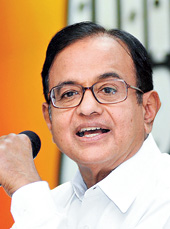
New Delhi, May 25: The Congress backlash to the BJP's "crony capitalism" charge witnessed Round II today, with former finance minister P. Chidambaram targeting Narendra Modi with a more explicit reference to an industrialist who has accompanied the Prime Minister on most of his foreign tours.
Yesterday, former commerce minister Anand Sharma had threatened to reveal the names of private players who had benefited at the expense of public sector units from the government's international deals.
Sharma had cited how Modi was "taking industrialists along for the signing of MoUs abroad" and "introducing one industrialist... even as State-to-State negotiations were being held" but had not named anyone.
Chidambaram too avoided names but cited a specific "incident" relating to an industrialist from Gujarat who is known to be close to Modi.
"Our record shows we achieved the best-ever growth rate of 8.5 per cent and sustained it for a decade. You don't get such a high growth if you run the economy based on crony capitalism," he said.
"Don't point fingers at us.... What do you call that incident when the Prime Minister on a state visit publicly says banker A will give industrialist B Rs 5,000 crore?"
On November 20 last year, the Congress had issued a media release questioning the SBI chairperson's promise of Rs 6,200 crore to industrialist Gautam Adani when an MoU was being signed in Australia.
The back-to-back counterattacks by Chidambaram and Sharma reflect the Congress's indignation at finance minister Arun Jaitley's charge that "crony capitalism" was the UPA government's downfall.
Chidambaram defended the UPA's record relating to the 2G and coal-block controversies. "The spectrum was allotted under the policy followed by successive governments since 1993, including the (Atal Bihari) Vajpayee government. The policy allowed allotment on a first-come-first-served basis," he said.
"Coal blocks were also allocated under the 1954 Act. If there was any irregularity or illegality in allotment, that is a matter of concern and the cases went to court."
Chidambaram warned Jaitley against coining clever phrases like "tax terrorism", citing how it had come back to haunt him.
He said the BJP, which had formed the first majority government at the Centre in 30 years, could easily have resolved the issue of retrospective tax without having to face the Rajya Sabha hurdle as it was a money bill. (The Rajya Sabha, where the government is now in a minority, cannot reject a money bill that has passed in the Lok Sabha.)
"I concede there was a problem of Vodafone (relating to a tax case) in our government and we tried to resolve it. But why haven't they done it so far?" the former finance minister added.
Chidambaram said the government lacked an "overarching vision" and "specific programmes" to achieve a high growth rate, and that there were worries that the Prime Minister and the finance minister were not reading the signals correctly.
"Credit growth is sluggish, demand is low, 161 PSU projects and 585 private projects are stalled, gold prices are surging, exports have shown negative growth, wages and disposable incomes are depressed, jobs are not being created, no bold structural reforms, FSLRC (Financial Sector Legislative Reforms Commission) recommendations are on the backburner, the direct tax code has been dumped," he said.
Asked what marks he would award the government for its performance in its first year, Chidambaram said: "It depends on who you ask."
He explained: "If you ask a farmer and an agriculture expert like Ashok Gulati, they will give zero out of ten. If you ask an industrialist who is promised Rs 5,000 crore by the SBI, he would give ten out of ten. On job creation, too, I will give zero out of ten."
Chidambaram repeated the charge that the Modi government was renaming and repackaging old schemes and projecting them as new schemes.
"We are happy, as imitation is the best form of flattery," he said. "We have not trumpeted our achievements as well and as cleverly as is being done now."
Asked about the petroleum pricing, he said Jaitley had not passed on to the consumer the benefits of the low international crude oil prices and had, instead, imposed taxes.










